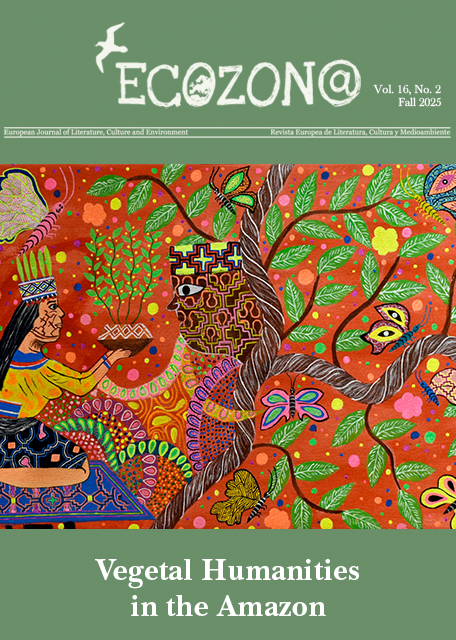Ecospirituality in the Age of Technological Overkill: Domestic Reclamation in the Fiction of Alan Lightman and Don DeLillo
DOI:
https://doi.org/10.37536/ECOZONA.2011.2.2.421Schlagworte:
technology, ecospirituality, nature, Lightman, DeLillo.Abstract
In exploring the link between ecospirituality and the hard sciences, I argue that the former provides a much-needed complement to the latter. The fragmentation of disciplinary pursuits fostered by the Enlightenment and by the continued progress of unquestioned technological advance as an end in itself finds its ultimate expression in our current disconnection from the natural world, from each other, and even from ourselves. As a corrective to such disconnection, ecospiritual impulses emerge in an attempt to unify a discombobulated subject, a self so fragmented by the multiple narratival requirements of a communication-obsessed age (where we can be reached by cell phone, regular phone, multiple email addresses, Facebook, and other social media) that the "contemplative" facet of being human within the rhythms of the natural world is all but obscured-indeed, is hardly given the requisite environment in which to function. Against this over-reliance on technology, on where the hard sciences have led us, ecospirituality emerges as a balm for the terrorized human spirit. Don DeLillo's recent novel Point Omega documents this poignantly. His narrator speaks of the "usual terror" of cities with their "endless counting down," with people constantly checking their watches and other time-keeping devices. DeLillo's protagonist moves to the desert where "geological time" becomes the paradigm through which a restorative calm is generated. Alan Lightman's fiction proves even more relentless in its depiction of the dissociation engendered by an over-reliance on technology. Lightman's protagonist in The Diagnosis is an information trader who suffers a breakdown and is only restored to well-being through a re-acquaintance with his own natural body rhythms along with those of the natural world. Many of the characters in the short-story collection Einstein's Dreams also find that a connection to nature counteracts the senseless competition of a consumer-driven, technologically-enhanced world.
Al explorar el nexo entre eco-espiritualidad y ciencias duras, sostengo que la primera proporciona un complemento necesario a las segundas. La fragmentación de los objetivos disciplinarios, promovida por la Ilustración y por un continuo progreso tecnológico incontestable, encuentra su expresión máxima en la actual desconexión del mundo natural, de los demás y de nosotros mismos. Contra dicha desconexión, los impulsos eco-espirituales surgen en un intento de unificar una materia confusa, un ser tan fragmentado por las múltiples exigencias de una época obsesionada con la comunicación (en la que se nos puede alcanzar por móvil, teléfono fijo, diferentes direcciones de correo electrónico, Facebook y otras redes sociales) que la faceta "contemplativa" de una existencia humana al ritmo del mundo natural no está del todo oscurecida, pero tampoco puede funcionar en su ambiente ideal. Contra esta sobre-dependencia en la tecnología a la que nos han llevado las ciencias duras, la eco-espiritualidad surge como bálsamo para el espíritu aterrorizado. La reciente novela de Don De Lillo Point Omega lo documenta de forma conmovedora. El narrador habla del "terror usual" de ciudades con su "interminables cuentas atrás", con la gente mirando continuamente sus relojes y otros dispositivos parecidos. El protagonista de De Lillo se muda al desierto, donde el "tiempo geológico" llega a ser el paradigma gracias al cual se genera una calma reparadora. La ficción de Alan Lighman resulta aun más despiadada al representar la disociación producida por la sobre-dependencia en la tecnología. En The Diagnosis, el protagonista de Lightman es un comerciante de información que sufre una crisis nerviosa y sólo le devuelve al bienestar el re-conocimiento de los ritmos naturales de su cuerpo y del mundo. También muchos de los personajes de la colección de relatos cortos Einstein's Dreams descubren que una conexión con la naturaleza contrarresta la absurda competencia de un mundo altamente tecnológico movido por el consumo.
Downloads
Downloads
Veröffentlicht
Ausgabe
Rubrik
Lizenz
Authors who publish with this journal agree to the following terms:
a) Authors retain copyright and grant the journal right of first publication with the work simultaneously licensed under a Creative Commons Attribution License that allows others to share the work with an acknowledgement of the work's authorship and initial publication in this journal (CC BY-NC for articles and CC BY-NC-ND for creative work, unless author requests otherwise.
b) Authors are able to enter into separate, additional contractual arrangements for the non-exclusive distribution of the journal's published version of the work (e.g., post it to an institutional repository or publish it in a book), with an acknowledgement of its initial publication in this journal.
c) Authors are permitted and encouraged to post their work online (e.g., in institutional repositories or on their website) prior to and during the submission process, as it can lead to productive exchanges, as well as earlier and greater citation of published work (See The Effect of Open Access).










